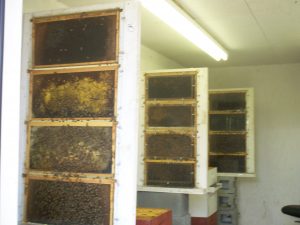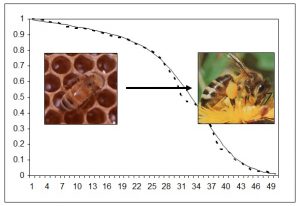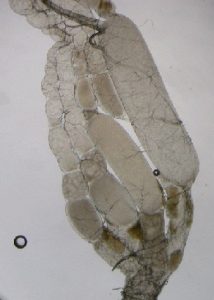Honey bees are unique models to understand the biology of aging because they show extreme plasticity in aging and live in complex, yet experimentally accessible societies. They are ideally suited to experimentally address the social dimension of aging and study cognitive and physiological aspects of aging. We use them as models to investigate general principles of aging, such as the relationship between functional and demographic senescence, the influence of social roles and social environment on individual life expectancy, and the plasticity of life history trajectories. The remarkable positive relation between reproduction and longevity in social insects is particularly interesting in this context, and a core question for us it how much of the longevity advantage of the reproductive queen over her non-reproductive workers is due to intrinsic properties versus social facilitation of long life.



Examples:
Rueppell O., Aumer D. & Moritz R.F.A. (2016) Ties between aging plasticity and reproductive physiology in honey bees (Apis mellifera) reveal a positive relation between fecundity and longevity as consequence of advanced social evolution. Current Opinion in Insect Science, 16: 64-68.
von Wyschetski K., Rueppell O., Oettler J. & Heinze J. (2015) Transcriptomic signatures mirror the lack of the fecundity / longevity trade-off in ant queens. Molecular Biology and Evolution, 32(12): 3173-3185.
Rueppell O., Koenigseder F., Heinze J. & Schrempf A. (2015) Intrinsic survival advantage of social insect queens depends on reproductive activation. Journal of Evolutionary Biology, 28(12): 2349-2354.
Rueppell O., Kaftanoglu O., Page R.E. (2009) Honey bee (Apis mellifera) workers live longer in small than in large colonies. Experimental Gerontology, 44: 447-452.
Rueppell O., Linford R., Gardner P., Coleman J., Fine K. (2008) Aging and demographic plasticity in response to experimental age structures in honeybees (Apis mellifera L). Behavioral Ecology and Sociobiology, 62: 1621-1631.
Rueppell O., Bachelier C., Fondrk M.K., Page R.E. (2007) Regulation of life history determines lifespan of worker honey bees (Apis mellifera L). Experimental Gerontology, 42: 1020-1032.
Rueppell O., Christine S., Mulcrone C., Groves L. (2007) Aging without functional senescence in honey bee workers. Current Biology, 17: R274-R275.